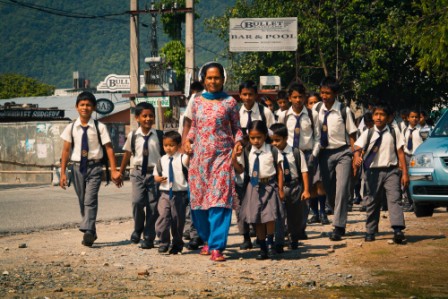Nepal's 'ghost schools' hide large-scale corruption
Kathmandu
They started appearing across Nepal's poorest districts several years ago -- partially built schools meant for local children and funded with public money.
The schools never opened. But many continued to receive funding from the government -- and possibly overseas donors -- in a long-running scandal uncovered by Nepal's anti-corruption watchdog.
"In some cases, we found a building, but no people. In other places there was nothing to see, the school only existed on paper nowhere else," said Keshav Ghimire, a spokesman for the Commission for the Investigation of the Abuse of Authority.
"Headmasters, government officials, everyone was involved. We found so many people who took money intended for a supposed school and pocketed it instead," Ghimire told AFP.
Authorities in the Himalayan nation have discovered more than 300 so-called ghost schools, all funded by the education ministry, which launched an overhaul of the country's crumbling schools in 2009.
Since then UNICEF, the World Bank, the European Union and Britain's Department for International Development have donated more than $500 million to the education department.
"We monitor our own training programmes carefully... but yes, it is possible that some of the money we give to the government could have gone to these ghost schools," Marilyn Hoar, chief of education at UNICEF Nepal, told AFP.
Some schools were allocated teacher salaries and allowances for "administrative expenses, student scholarships and physical construction works", according to the corruption watchdog.
The government has so far filed 50 court cases against officials and teachers who pocketed funds meant for the schools, according to Bishwa Prakash Pandit, education secretary.
"It's hard to put an exact number on the losses, but I estimate it must have cost the exchequer around 120 million rupees ($1.2 million), since many of these so-called schools were (supposedly) running for a couple of years," Pandit told AFP.
"We were trying to promote education, we had a liberal policy on spending, and I suppose we approved requests for funds too easily."
The watchdog's annual report released in April also accuses officials of inflating the cost of textbooks and other materials at schools that were operating by around 30 million rupees last year and pocketing the cash.
- 'Lost generation' -
Most of the ghost schools were located along Nepal's southern plains, where poor infrastructure and high unemployment have long fuelled discontent.
The corruption watchdog also found examples of absentee teachers -- those who were paid by existing schools without showing up to work -- and of unlicensed teachers who did turn up, but were not qualified.
Nagendra Raj Paudel, a local education official in Rautahat district where six out of 10 children under 15 are illiterate, told AFP some absentee teachers moonlight as political workers despite laws banning the practice.
"In my district alone, we had around 400 teachers who would take salaries and never turn up to work," said Paudel, who ended up asking for a transfer because of pressure from local politicians.
Corruption is rife throughout Nepal, ranked 126th out of 175 countries in watchdog Transparency International's global corruption perception index.
In 2010, pressure from international donors led to the sacking of Nepal's education minister, accused of collecting bribes from more than 1,000 people in exchange for teaching jobs.
Enrolment in government schools has increased in recent years, but experts say corruption levels mean the quality of education is poor. Some 67 percent of tenth-graders attending state schools failed their final exams this summer.
"The quality of education is definitely an issue that concerns us... a sample survey showed that only 37 percent of children in grade two could read a single word correctly, that dropped to 19 percent for grade three," said UNICEF's representative in Nepal, Tomoo Hozumi.
Experts believe the corruption and its impact on the already poor quality of education has major implications for the future of the impoverished country, whose education system took a major blow when a devastating earthquake struck earlier this year.
The disaster damaged nearly 8,000 schools, leaving almost a million children without classrooms.
Since the report was made public, the government has taken little action apart from cutting off funds to the ghost schools and filing dozens of cases.
Corruption watchdog spokesman Ghimire said the organisation was pressing authorities to improve transparency.
"We would like to see long-term changes, starting with better monitoring of budgets, of how money is spent... so the poorest children can get an education, not just those whose parents can afford to send them to private schools," he said.
"The vast majority of students in this country attend public schools," said Mana Prasad Wagley, dean of education at Kathmandu University.
"If we don't act now to save those schools, those families will just take their kids out and put them to work as porters and domestic help.
"As long as foreign donors keep handing over funds, there will be no incentive to change anything.
"In the meantime, we are raising a lost generation."
Related Posts

